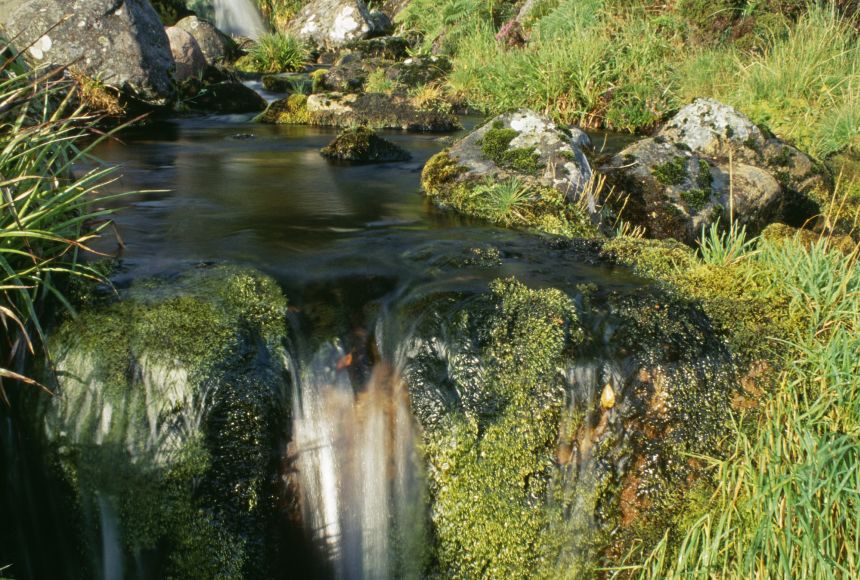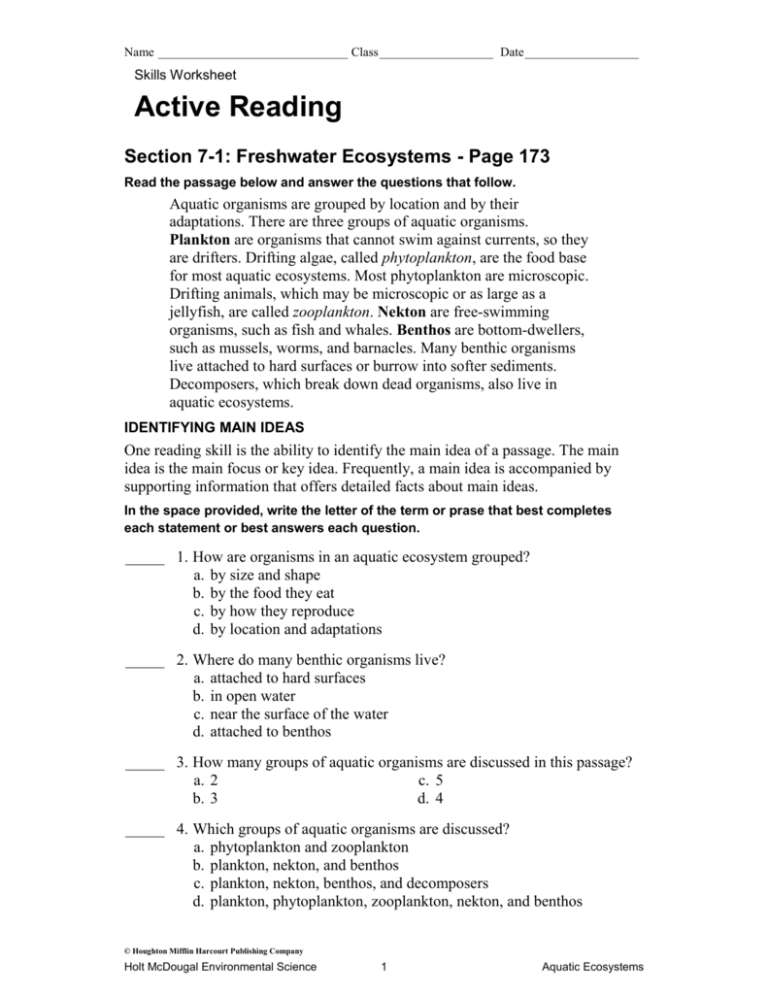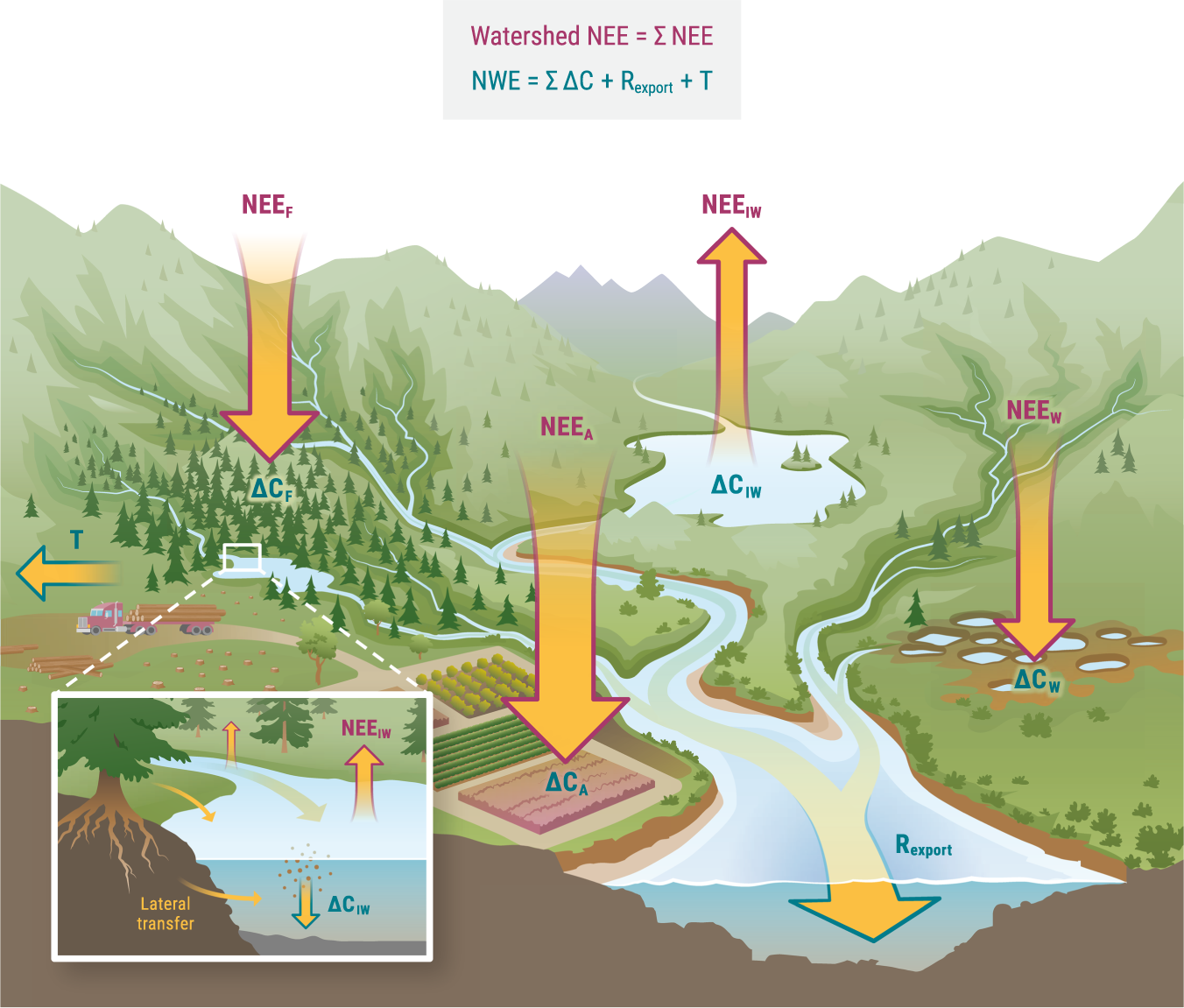Topic ecosystem benefits: Explore the incredible ecosystem benefits that sustain our planet, from purifying water to providing vital resources, ensuring a harmonious balance for future generations.
Table of Content
- What are the benefits of ecosystems?
- Overview of Ecosystem Services
- Provisioning Services: Food, Water, and Resources
- Regulating Services: Climate and Disease Control
- Cultural Services: Recreation and Spiritual Benefits
- Supporting Services: Nutrient Cycling and Soil Formation
- Ecosystems and Biodiversity
- YOUTUBE: Ecosystem services: Biodiversity and nature\'s benefits for humans
- Human Well-being and Ecosystem Health
- Challenges and Conservation Efforts
- Future Perspectives and Sustainable Practices
What are the benefits of ecosystems?
The benefits of ecosystems are numerous and play a crucial role in maintaining a healthy environment and supporting human well-being. Here are some key benefits of ecosystems:
- Provisioning Services:
- Food production: Ecosystems provide us with a variety of food sources such as fruits, vegetables, seafood, and meat.
- Raw materials: Ecosystems supply resources like timber, fibers, and medicinal plants that are used for various purposes.
- Water resources: Ecosystems contribute to the regulation and purification of water, ensuring access to clean and fresh water.
- Energy production: Some ecosystems, like forests and wetlands, provide renewable sources of energy such as biomass and hydropower.
- Regulating Services:
- Climate regulation: Ecosystems help regulate global and local climates by absorbing carbon dioxide, emitting oxygen, and influencing weather patterns.
- Water regulation: Ecosystems play a crucial role in regulating water flow, controlling floods, and recharging groundwater.
- Pollution control: Natural processes within ecosystems help filter and degrade pollutants, improving air and water quality.
- Pest control: Ecosystems provide natural pest control services by maintaining predator-prey relationships and reducing the need for chemical interventions.
- Cultural Services:
- Recreation and tourism: Ecosystems offer opportunities for outdoor activities, relaxation, and tourism, contributing to leisure and well-being.
- Education and inspiration: Ecosystems provide a rich source of inspiration for art, literature, and culture. They also serve as living classrooms for learning about nature and the environment.
- Spiritual and aesthetic values: Many people find solace, peace, and spiritual connection in natural environments, with ecosystems playing a fundamental role.
- Supporting Services:
- Biodiversity: Ecosystems support a diverse array of species, helping to maintain the balance of ecosystems and ensuring their resilience.
- Soil formation: Ecosystems contribute to the development and maintenance of fertile soils through processes like decomposition and nutrient cycling.
- Nutrient cycling: Ecosystems efficiently recycle and redistribute nutrients, enhancing soil fertility and supporting the growth of plants.
- Primary production: Ecosystems, especially photosynthetic ones like forests, grasslands, and oceans, are responsible for producing oxygen and capturing carbon dioxide.
These ecosystem benefits highlight the importance of preserving and restoring ecosystems for the sustainable use of natural resources and the well-being of both humans and the planet.
READ MORE:
Overview of Ecosystem Services
Ecosystem services are the many and varied benefits that humans freely gain from the natural environment and from properly-functioning ecosystems. Such ecosystems include, for example, agroecosystems, forest ecosystems, grassland ecosystems and aquatic ecosystems. Collectively, these benefits are becoming increasingly important in our understanding of how to maintain a sustainable planet. Ecosystem services are often grouped into four broad categories:
- Provisioning Services - These include the products obtained from ecosystems, such as food, fresh water, wood, fiber, genetic resources, and medicines.
- Regulating Services - These services include the regulation of processes such as climate regulation, flood control, disease regulation, water purification, and pollination.
- Cultural Services - These are the non-material benefits people obtain from ecosystems through spiritual enrichment, cognitive development, reflection, recreation, and aesthetic experiences.
- Supporting Services - Services such as soil formation, photosynthesis, nutrient cycling, and the water cycle, which underpin the provision of all other ecosystem services.
Understanding these services helps us appreciate the direct and indirect contributions of ecosystems to human well-being, emphasizing the necessity to protect and conserve our natural environments for the benefit of all life on Earth.
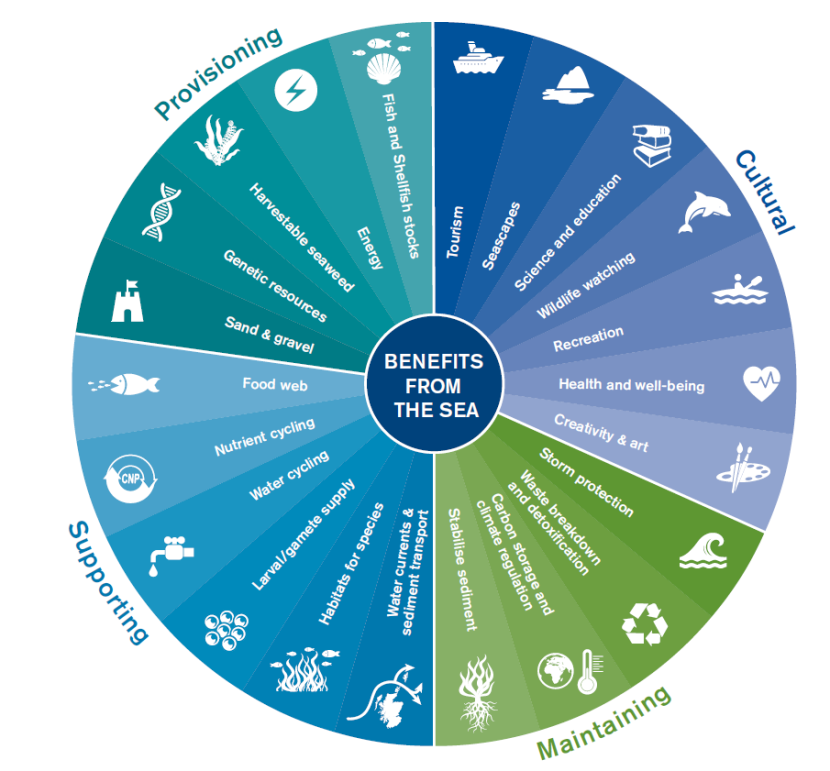
Provisioning Services: Food, Water, and Resources
Provisioning services are the products obtained from ecosystems, vital for human survival and economic activity. These services ensure the availability of essential resources, demonstrating nature"s generosity and its foundational role in our lives. The main types of provisioning services include:
- Food: Ecosystems provide the variety of foods we consume, including fruits, vegetables, grains, livestock, and fish, all of which are crucial for nutrition and cultural practices.
- Water: Freshwater ecosystems supply the water necessary for drinking, irrigation, sanitation, and industrial processes, underscoring the importance of clean and accessible water sources.
- Natural Fibers and Materials: Materials for clothing, shelter, and tools, such as wood, hemp, cotton, and silk, are obtained from forest and plant ecosystems.
- Medicinal Resources: Many pharmaceuticals are derived from compounds found in plants, animals, and fungi, highlighting the importance of biodiversity in medical research and healthcare.
- Energy Resources: Ecosystems contribute to energy supplies through biofuels, wind power, and hydropower, showcasing renewable alternatives to fossil fuels.
These provisioning services not only fulfill basic human needs but also play a critical role in the economic development and cultural identity of communities around the world. Protecting and sustainably managing ecosystems is essential to ensure the continued availability of these invaluable resources.
Regulating Services: Climate and Disease Control
Regulating services are critical ecosystem functions that maintain the balance of natural processes, contributing to climate stability and disease control among other benefits. These services are indispensable for creating a resilient and healthy environment for all living beings. Key regulating services include:
- Climate Regulation: Ecosystems like forests and oceans act as carbon sinks, absorbing CO2 from the atmosphere and mitigating the effects of climate change. Wetlands and forests regulate temperature and precipitation patterns, supporting climate stability.
- Flood Regulation: Natural landscapes, such as wetlands, forests, and riverbanks, absorb excess rainwater, reducing the risk and severity of floods, thus protecting communities and their livelihoods.
- Disease Regulation: Healthy ecosystems control the populations of disease vectors such as mosquitoes and ticks, reducing the spread of diseases like malaria and Lyme disease.
- Water Purification: Ecosystems naturally filter pollutants from water through processes in soil and vegetation, ensuring the provision of clean water for drinking, agriculture, and recreation.
- Pollination: Bees, birds, bats, and other animals pollinate plants, essential for the production of fruits, vegetables, and seeds, supporting agriculture and food security.
- Air Quality Maintenance: Vegetation and wetlands filter pollutants and dust from the air, improving air quality and contributing to human health and well-being.
These regulating services underscore the importance of preserving ecosystems not only for their inherent value but also for their role in supporting life on Earth through natural processes. By maintaining healthy ecosystems, we ensure the continuation of these vital services for future generations.
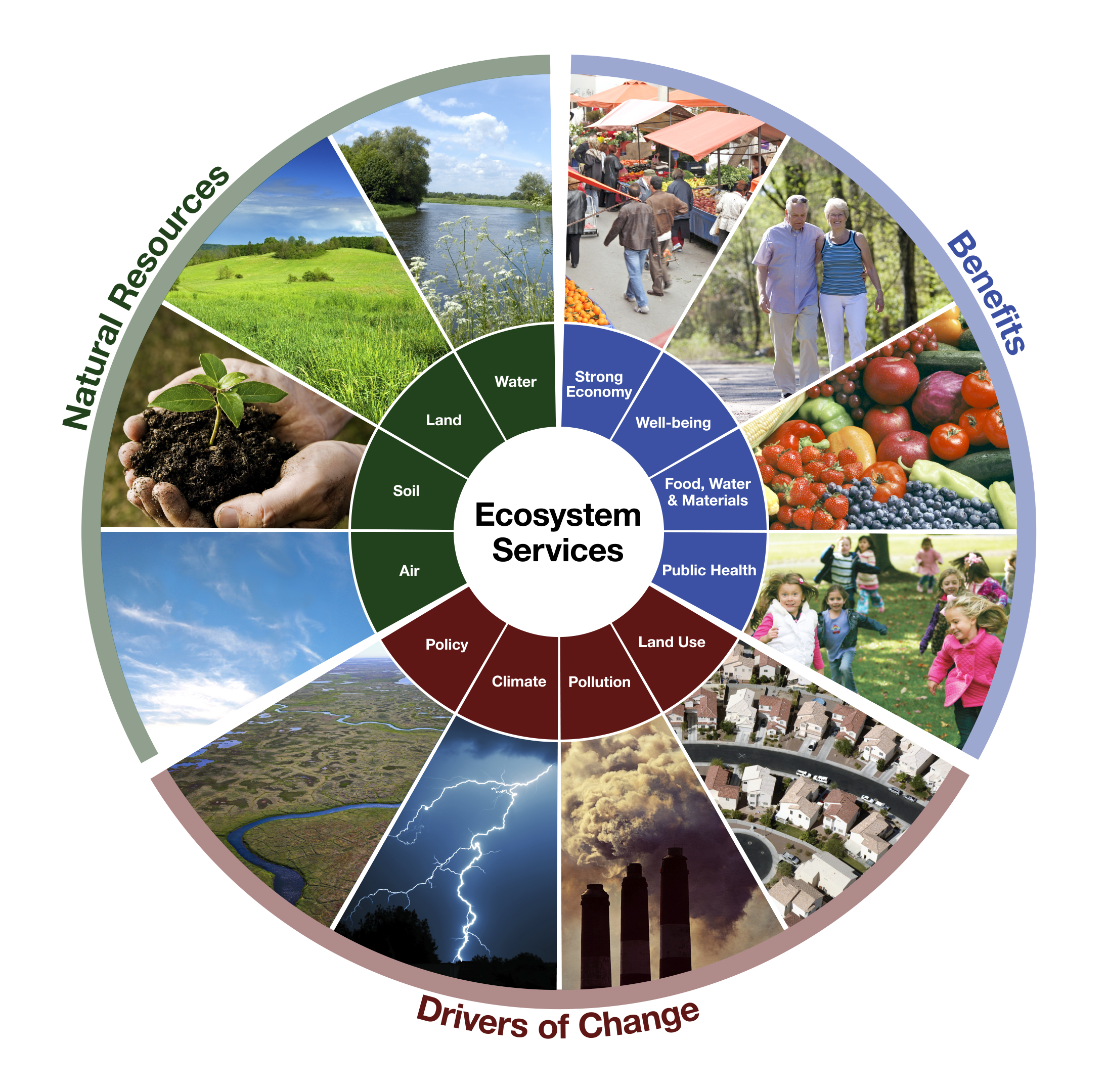
Cultural Services: Recreation and Spiritual Benefits
Cultural services offered by ecosystems enrich human life through recreational, aesthetic, and spiritual experiences. These services foster a deep connection between people and nature, enhancing mental and physical well-being. The main aspects of cultural services include:
- Recreational Activities: Natural areas provide spaces for hiking, birdwatching, fishing, and camping, allowing individuals to relax and enjoy outdoor pursuits that contribute to physical health and emotional well-being.
- Aesthetic Appreciation: The beauty of natural landscapes inspires art, folklore, national symbols, and personal reflection, influencing culture and creativity.
- Spiritual and Religious Significance: Many cultures attribute spiritual and religious meanings to certain natural sites, which become places of worship, pilgrimage, and reflection, contributing to cultural identity and cohesion.
- Educational Value: Nature serves as an invaluable classroom, offering endless opportunities for learning and discovery about the environment, conservation, and sustainability.
- Cultural Heritage and Identity: Natural landscapes are integral to the cultural heritage and identity of communities, preserving traditional knowledge, customs, and practices linked to the environment.
By valuing and protecting these cultural services, we not only preserve the richness of our natural heritage but also ensure the continuation of these benefits for future generations, reinforcing the importance of ecosystems in our lives.
Supporting Services: Nutrient Cycling and Soil Formation
Supporting services are fundamental ecological processes that underpin all other ecosystem services, making life on Earth possible. Nutrient cycling and soil formation are crucial components of these services, ensuring the health and productivity of ecosystems. These processes include:
- Nutrient Cycling: Ecosystems recycle nutrients like nitrogen, carbon, and phosphorus through soil, plants, and animals, maintaining the health of the biosphere. This cycling supports all forms of life by facilitating growth, reproduction, and the maintenance of healthy ecosystems.
- Soil Formation: The formation of soil is a slow but vital process involving the weathering of rock and the decomposition of organic matter, which creates the fertile ground necessary for plant growth. Soil is a critical resource for agriculture, forestry, and habitat creation.
- Photosynthesis: This process, carried out by plants, algae, and certain bacteria, converts light energy into chemical energy, producing oxygen and organic compounds that are fundamental to most life forms on Earth.
- Water Cycle Regulation: Ecosystems play a key role in the water cycle, including the capture, storage, and release of water, ensuring its availability for ecosystems, humans, and agriculture.
- Primary Production: The conversion of solar energy into biomass through photosynthesis is the basis for the energy flow through ecosystems, supporting a diverse array of life forms.
These supporting services are not only essential for the survival of ecosystems but also provide the foundation upon which humans have built civilizations. By understanding and protecting these fundamental processes, we ensure the sustainability of our planet"s resources for future generations.

Ecosystems and Biodiversity
The diversity of life on Earth, known as biodiversity, is intricately linked with the health and functionality of ecosystems. Ecosystems thrive on diversity, with each species playing a specific role in maintaining ecological balance. This section explores the vital connections between ecosystems and biodiversity:
- Importance of Biodiversity: Biodiversity boosts ecosystem productivity where each species, no matter how small, all have an important role to play. A well-balanced ecosystem is more resilient and able to withstand environmental stress and recover from disturbances.
- Threats to Biodiversity: Habitat loss, climate change, pollution, overexploitation, and invasive species are significant threats to biodiversity. These threats lead to ecosystem degradation and loss of species.
- Conservation Efforts: Protecting and restoring habitats, establishing protected areas, and implementing sustainable management practices are crucial for conserving biodiversity. Conservation efforts aim to maintain ecological balance and ensure the survival of species.
- Benefits of Biodiversity: A rich biodiversity provides a variety of foods, medicines, and materials. It supports ecosystem services like water purification, pollination, and climate regulation, directly impacting human well-being.
- Human Impact: Human activities have a profound impact on ecosystems and biodiversity. Sustainable practices and policies are essential to reduce negative impacts and promote a harmonious coexistence with nature.
Understanding and preserving biodiversity is essential for the sustainability of ecosystems upon which humans and all other life forms depend. By valuing and protecting biodiversity, we support the intricate web of life that sustains us.
Ecosystem services: Biodiversity and nature\'s benefits for humans
\"Discover the wonders of biodiversity in this captivating video! Immerse yourself in the beauty and diversity of life on our planet as we explore the intricate relationships between species and learn why preserving biodiversity is crucial for our future.\"
What are ecosystem services?
\"Uncover the hidden treasures of ecosystem services in this eye-opening video! Journey through the intricate web of interactions between organisms and their environments, and gain a newfound appreciation for the essential benefits provided by healthy ecosystems.\"
Human Well-being and Ecosystem Health
The interdependence between human well-being and ecosystem health is undeniable. Healthy ecosystems contribute to human health and prosperity, whereas degraded ecosystems can adversely affect human communities. This section highlights the relationship between human well-being and the health of ecosystems:
- Provision of Essential Services: Clean air, fresh water, food security, and access to medicinal resources are direct benefits of healthy ecosystems to human well-being.
- Physical and Mental Health Benefits: Natural environments play a crucial role in physical activities and mental health improvement, reducing stress and enhancing overall happiness.
- Economic Benefits: Many economies are directly linked to the health of ecosystems, particularly those dependent on agriculture, fishing, and tourism.
- Cultural and Recreational Value: Ecosystems offer cultural significance and recreational activities that enrich human life and foster a sense of belonging and identity.
- Climate Regulation and Disaster Mitigation: Ecosystems like forests and wetlands play critical roles in regulating the climate and protecting against natural disasters, thereby securing human settlements.
- Education and Awareness: Nature serves as a dynamic classroom for learning about environmental stewardship, promoting a sustainable relationship between humans and the planet.
Maintaining ecosystem health is paramount for ensuring human well-being. Sustainable management of natural resources and conservation efforts are essential to preserve these benefits for current and future generations. By understanding the value of ecosystems, societies can develop strategies that support both ecological integrity and human prosperity.
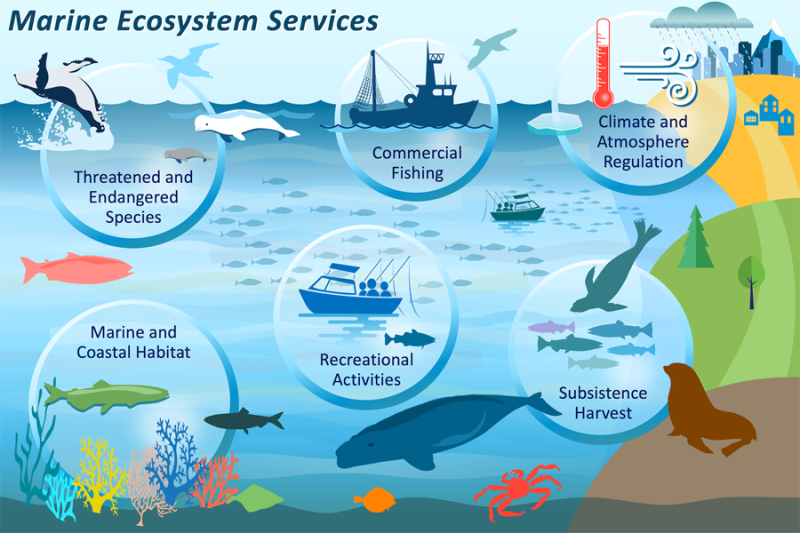
Challenges and Conservation Efforts
The preservation of ecosystems and their benefits faces numerous challenges, including climate change, habitat destruction, pollution, and overexploitation of resources. Addressing these challenges requires concerted conservation efforts and sustainable practices. This section outlines the key challenges and the efforts being made to protect ecosystems:
- Climate Change: Rising temperatures and changing weather patterns threaten biodiversity and disrupt ecosystem services. Conservation efforts focus on reducing greenhouse gas emissions and enhancing ecosystem resilience.
- Habitat Destruction: Urbanization, deforestation, and agriculture expansion lead to loss of habitats. Efforts to combat this include creating protected areas, restoring damaged ecosystems, and promoting sustainable land use practices.
- Pollution: Water, air, and soil pollution from industrial, agricultural, and domestic sources degrade ecosystems. Initiatives to reduce pollution include stricter regulations, pollution control technologies, and public awareness campaigns.
- Overexploitation: Overfishing, unsustainable agriculture, and illegal wildlife trade deplete resources. Sustainable management practices and enforcement of conservation laws are vital responses.
- Biodiversity Loss: The loss of species due to human activities threatens ecosystem balance. Biodiversity conservation strategies involve species protection, habitat conservation, and the restoration of ecological corridors.
- Community Engagement and Education: Engaging communities in conservation efforts and increasing environmental awareness are crucial for fostering stewardship of natural resources.
Through international cooperation, policy development, scientific research, and community involvement, significant strides are being made to address these challenges. Conservation efforts are essential for ensuring the sustainability of ecosystems and the continued provision of their benefits to humanity.
READ MORE:
Future Perspectives and Sustainable Practices
As we look to the future, the sustainability of ecosystems and their benefits hinges on the adoption of sustainable practices and the resilience of communities and ecosystems to change. This section explores future perspectives and the sustainable practices essential for preserving ecosystem services:
- Adaptive Management: Implementing flexible management strategies that can be adjusted in response to ecological monitoring and feedback, ensuring ecosystems can adapt to changing conditions.
- Restoration and Rehabilitation: Restoring degraded ecosystems and rehabilitating lands and waters can enhance biodiversity, improve ecosystem services, and increase resilience to environmental changes.
- Green Infrastructure: Developing green spaces in urban areas, such as parks, green roofs, and urban forests, to support biodiversity, improve air and water quality, and provide recreational spaces.
- Sustainable Agriculture and Forestry: Adopting practices that increase productivity without degrading the land, such as agroforestry, conservation tillage, and organic farming, to ensure food security and conserve biodiversity.
- Renewable Energy: Transitioning to renewable energy sources like solar, wind, and hydro power reduces dependency on fossil fuels and mitigates climate change impacts.
- Conservation Policies: Strengthening and enforcing policies that protect natural habitats, regulate resource use, and promote conservation initiatives at local, national, and international levels.
- Community Involvement and Education: Engaging communities in conservation efforts and environmental education promotes stewardship of natural resources and fosters a culture of sustainability.
The future of ecosystems and their capacity to provide benefits for generations to come depends on our actions today. By embracing sustainable practices and fostering a global commitment to environmental stewardship, we can ensure the health and vitality of our planet"s ecosystems.
Embracing the myriad benefits ecosystems offer is pivotal for our future. By valuing and actively protecting these natural treasures, we ensure a prosperous, sustainable world for generations to come.

